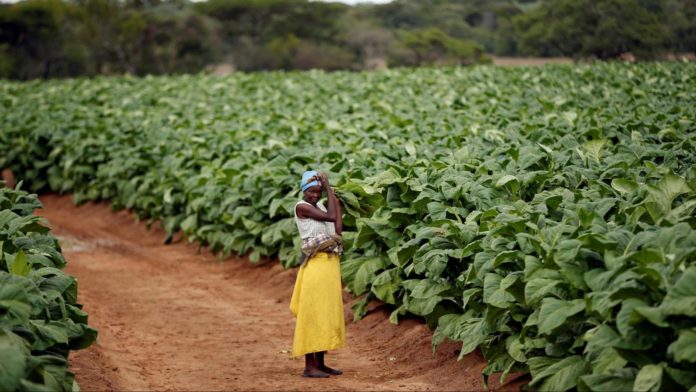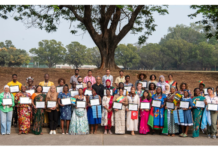Contract tobacco farmers in Zimbabwe are decrying drowning in debt. More than 20,000 farmers in Zimbabwe grow tobacco for Tian Ze, a subsidiary of the state-run China National Tobacco Corporation and the top buyer of the country’s tobacco by value. Established in 2005, the Chinese-owned company has been credited with resurrecting Zimbabwe’s tobacco industry after it was crippled by a violent land reform program and Western sanctions.
The relationship has proved mutually beneficial for long-time allies Harare and Beijing: Zimbabwe, now Africa’s top tobacco producer, offers China Tobacco a ready supply of leaf to feed its growing business, while tobacco exports have become an important source of badly needed foreign currency for Zimbabwe’s government.
But as the two governments profit, it is farmers who are paying the price. Growers say they often end up trapped in a painful debt cycle as they struggle to pay for expensive inputs they can ill afford a claim backed up by researchers while a controversial currency system run by Zimbabwe’s central bank saps much of what is left of their income. Caught in a system that seems rigged against them, many growers have been left ruined.
Tian Ze spokesperson Li Wenjie denied that it overcharged for the inputs it provides to its growers, and argued that it is the only company that offers interest-free loans and pays the highest average prices for tobacco in the country.
“All the inputs we give to farmers are given at the suppliers’ price; we do not [add] any markup,” he said. “We support the farmers.”
Foreign reserves
Asked for comment, Reserve Bank of Zimbabwe governor John Mangudya said the exchange system was vital to ensure the country had enough foreign reserves, and that tobacco farmers actually had to surrender less of their foreign currency earnings than other business people.
“Tobacco farmers are in a much better position compared to other exporters when it comes to forex surrender or retention requirements,” he said.
Zimbabwe has been scrambling to get hold of U.S. dollars since its currency collapsed in 2007, precipitating the country’s spiral into hyperinflation, and a desperate economic crisis that continues to this day.
The Reserve Bank of Zimbabwe has rules requiring all traders to surrender part of their foreign earnings, which is then converted into a quasi-currency based on government bonds either physical bond notes or their digital equivalent. But because the bank uses an official rate that overvalues the local tender, it ends up keeping most of traders’ incomes.
Zimbabwe’s government uses the foreign currency it accrues to service its international debt, about a third of which it owes to China. Some is spent on critical imports such as fuel and medicine. But some reportedly goes to luxury goods for senior officials, including buying top-of-the-range vehicles for ambassadors, senior civil servants, and army officers.
The currency exchange system has been denounced as illegal by Zimbabwe’s own lawmakers. A 2019 report by the Public Accounts Committee found the central bank had retained billions of U.S. dollars under these rules, which it described as “an unlawful appropriation of private property” that breached the Constitution.
Quasi-currency
Believe Tevera, president of the Tobacco Farmers Union of Zimbabwe, called the central bank’s system “exploitative.” We have been lobbying the government to change, but it is not yielding because [tobacco export earnings] provide easy and cheap access to foreign currency,” he said.
Zimbabwe requires Tian Ze to pay its contract tobacco farmers through the Central Bank in a mixture of U.S. dollars and local quasi-currency, while their loans must be paid off in foreign currency alone. Most of their earnings get eaten up paying back loans for inputs like seeds and fertilizer. Then, because the official exchange rate for the quasi-currency is drastically overvalued compared to the commonly used black-market rates, farmers lose much of what’s left over.
Many farmers end up with barely enough to survive. An infographic for 2019-2020 showing how farmers run the risk of taking on debt they cannot afford, with inputs priced in dollars and the cost of loans taken out of their pay before they make any income. If contract farmers don’t pay Tian Ze and a legal process ensues, the farmers are required to pay the costs of the proceedings.
Tian Ze’s contract system, which is now being adopted by other tobacco companies, leaves farmers more vulnerable to sliding into debt. A 2019 paper by academics from the University Of Cape Town School Of Economics based on research done in Manicaland, Zimbabwe’s fourth-biggest tobacco growing region, found contractors were 15 to 20 percent more likely to be in the red than independent growers.
“The debt compels them to grow tobacco in the following farming season, in an often-vain attempt to repay the debt. The cycle is usually repeated, making tobacco growing a debt trap, leading to a vicious cycle of poverty,” the authors wrote.








